Italy in revolt
21/12/2013 · by Leonardo Mazzei
The international corporate media decided to maintain low profile, but for weeks Italy is revolting. From the northeast down to Sicily a movement called “Forconi” (dung forks) is rocking the country. Actually the Forconi, originating from Sicily, are only one component of the mobilization lending their name.
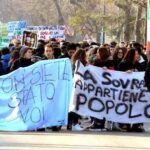
The demonstrations have started out on December 9 called for by autonomous organizations of the toiling masses (peasants, lorry drivers, small entrepreneurs, etc.) but included all sectors of the people hit by the crisis and especially by the sacrifices imposed by the European Union (EU).
Main instrument of struggle are road blocks: In some cases the highway toll stations were occupied completely blocking the traffic. In most cases traffic was slowed down involving private and first of all professional drivers. The mobilization is working: Activists distribute leaflets, drivers stop and sound their horns – now for some two weeks in 135 Italian cities.
In some towns protests were even stronger. In Turin commercial activities were paralyzed for three days. In Genoa and smaller towns …
[read more]Tunisia out of the impasse?
Hoping for an orderly retreat of Ennahda to avoid a return to the old regime
27/11/2013 · by Wilhelm Langthaler
Tunisia was the starting point of the Arab peoples’ revolt. In the central countries of Egypt and Syria, however, the movement is threatened to subside in repression and violence. Again, it is Tunisia, which gives grounds for hope: Ennahda could withdraw from the government without violence paving the way for early elections. Thus the democratic gains could be saved from the threat of a counter-revolution on behalf of the old elites.
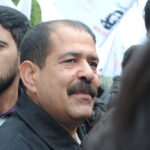
Should this succeed - which is by no means certain - Tunisia might serve as a role model. This would strengthen the already-won democratic rights and the path to independent articulation and organization of the subaltern masses against the social elites would be paved.
Let’s try to read the trends in Tunisian society and to draw wider conclusions reaching beyond the small country.
1. Islamists losing influence
Following the overthrow of Ben Ali, the Islamist Ennahda party, a force including several tendencies, emerged as the central power of the new government enjoying a strong relative electoral majority. Although it is true that the popular movement against Ben Ali was influenced by the Left while the Islamists had played only a secondary role, the leading governmental …
[read more]Reading the Iran deal
Global stalemate acknowledged
25/11/2013 · by Wilhelm Langthaler
The beginning détente between the US and Iran is opening a new chapter of global relations. It is not only a game changer in the Syrian arena but will prompt a re-configuration of the Middle East’s setup. Ultimately it indicates another step towards the multi-polar world – but a modest one confirming US supremacy with indirect rule.
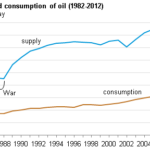
The conflict’s background
The base of the antagonism between the West and Iran remains the revolution of 1979 which had a strong anti-imperialist momentum and remains until now one of the most important popular revolutions of the regions or even the world. The Islamic Republic is, however, not a direct, linear, immediate expression of the popular and anti-imperialist tendencies but rather its mediation broken by clerical rule.
We just have to remember the Iraq-Iran war. With its approach of dual containment Washington carefully balanced its proxy support to both sides. The war served the Mullahs as a formidable tool to bend the power of the popular movement having emerged during the revolution.
Take as further evidence the unequal couple of Rafsanjani and Khatami during the …
[read more]Austrian regime confirmed though weakened
Lower classes strengthen social but chauvinist opposition
3/10/2013 · by Wilhelm Langthaler
First: the ruling system has been confirmed though losing consensus. Second: the electoral protest remains within systemic forms. Third: an anti-systemic, let alone social revolutionary momentum continues to be a mere desiderate.
For decades Austria has been ruled by what is called “Big Coalition” between the Social Democrats (SPOe) and the Christian Democrat People’s Party (OeVP) with only few exceptions. Both regime components attempted to claim Merkel’s sweeping electoral victory for themselves. In a certain sense both were right – and nonetheless failed to achieve the same victory.
The SPOe, for two generations the strongest party, is the anchor of (alleged) stability. Regarding culture, social composition as well as social policy they represent the centre. Though this implies to execute the neo-liberal dictates of the European oligarchy (save the bank capital, impose austerity), they try to do this in a way they call equilibrated. If one compares it to other European countries they are even …
[read more]Seven steps to save Italy
The acute governmental crisis and the forthcoming mobilisations
3/10/2013 · Popular Liberation Movement (MPL)
Not pure desperation, but a political calculation has guided Berlusconi’s attempt to let all his parliamentarians resign. What would have happened had he succeeded?
He had anticipated the electoral clash in order to vote with the current voting system still in place. The reason is simple: ungovernability had persisted and the “Berluscones”, given that the M5S (Five Star Movement) is not ready to make any accord with the ruling pro-euro clique, still held the key in hands for the formation of a new government.
As a matter of fact president Napolitano, in name of the dominant European and Italian classes, has done and will do everything in order to avoid elections on the basis of the current electoral law. For the time being they won the game – but for how long is another question.
Their bloc is economically dominant, but no more politically, because it doesn’t enjoy the necessary social consent to govern undisturbed.
Following the …
[read more]Germany: triumph of middle class common sense
Or: full speed towards disaster
26/9/2013 · by Wilhelm Langthaler
First thoughts on the electoral victory of the ruling oligarchy
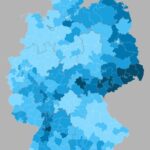
Appalling victory
From a social revolutionary point of view, Merkel’s sweeping electoral success is abominable. It follows, however, a political-cultural pattern of the German middle classes whose culture dominates the broad masses and therefore also the electorate. It was all about to continue the alleged German Wirtschaftswunder (economic miracle) contrasting with the catastrophe the south is suffering of. The middle classes seek stability and want to avoid taking risk for the weaker eurozone states. But ultimately they do accept measures to prevent the euro crisis from erupting again. Further haircuts for Greece will be unpopular but they trust Merkel to do what is necessary and nothing more. On the surface the petty bourgeois has reason to believe what Merkel has been claiming: …
[read more]US prisons in Afghanistan
The forgotten horror
20/9/2013 · Left Radical of Afghanistan (LRA)
The US government in addition to keep in detention thousands of Afghans, hundreds other non Afghan national also have been elapsing their lives in its awful several prisons in Afghanistan including Bagram near Kabul city without charges and trial since 2002.
The Bagram prison established in 2002 under US in Afghanistan is known as world most dreadful prison where systematically and openly the basic rights of human rights and prisoners rights are violated by US authorities from military forces to diplomats and judicial authorities. The prisoners are deprived of having contact with their families and friends and outside prisons world.
Lack of access to defender lawyer, court trial and other legal assistance, keeping detainees even after expiring their sentence period are some samples of US authorities commitment to human rights .There is no access of “Human rights defender” organizations to the detentions site under US in Afghanistan. Those “Human Rights” organizations that succeeded to visit a small and well decorated site of the …
[read more]Syria: negotiate a transitional government
No to the US attack and continued military pressure
15/9/2013 · by Wilhelm Langthaler
We are relieved that the imminent threat of an US aggression on Syria is preliminarily put on hold and a diplomatic channel has been opened up. But the US military power projection remains in place and the bloody civil war continues. We therefore need to continue and step up the campaign against foreign intervention and especially the western one. But at the same time we ought to help to pave the way for a transitional government fulfilling the demands of the original democratic popular movement.
From the very beginning of the conflict we have been strongly opposing any foreign meddling let alone military intervention. As anti-systemic opposition in the west we regard it as our main task to fight imperialism and neo-colonialism disguised as humanitarianism, export of democracy, responsibility to protect or similar camouflages. This is an issue of principle which proved valid in Yugoslavia, Afghanistan, Iraq and many other places.
In Syria foreign interference has been crucial in transforming the civil democratic and social movement of the popular masses into a sectarian civil war destroying the hope for victory for the people as subaltern classed opposed to the elite.
At the origin of this tragic metamorphosis is certainly the refusal of the Assad leadership to grant …
[read more]Popular Movement for One Democratic State on the Land of Historical Palestine
Founding Statement
1/9/2013
The popular movement announced its establishment on May 15, 2013, (The Nakba Day), in Ramallah.
The catastrophe of the Palestinian people has continued for over a century. This catastrophe began with the Balfour Declaration, issued on November 2, 1917 by the British Foreign Secretary Arthur James Balfour to Baron Walter Rothschild, a leader of British Jewry for transmission to the Zionist Federation of Great Britain and Ireland. The Balfour Declaration was followed by the imposed British Mandate for Palestine of 16 September 1922, which denied the Palestinian people their natural right to self-determination and the establishment of their independent state on their national land.
This catastrophe was aggravated by the disaster of the Nakba of 1948, which resulted in the seizure by Israel of most of the Palestinian territory, the displacement of almost 750 thousand Palestinians, …
[read more]No military intervention - for a political solution
Call to action
31/8/2013 · Peace Initiative for a Political Solution in Syria
NO TO AN OPEN MILITARY INTERVENTION – CALL FOR A POLITICAL SOLUTION!
With the latest use of chemical weapons the bloodshed in Syria is about to turn into a real humanitarian disaster. Whoever are the perpetrators and intellectual authors of this abominable crime is not only responsible for this mass murder on the innocent population of Ghouta but also of tens of thousands of other victims who are going to follow if the world is no capable to stop this war.
When we, representatives of different sectors of civil societies from all continents, started the www.peaceinsyria.org initiative under the slogan YES TO DEMOCRACY – NO TO MILITARY INTERVENTION we could no t foresee that the nightmare of millions of Syrians could degenerate into a humanitarian catastrophe which not only shakes the whole Middle East, but also threatens world peace on a global level.
It is now more than ever facing the danger of an open military intervention on both sides of the conflict that we want to call on the international public opinion to exercise its influence in order to prevent that the daily figures of hundreds of killed victims turn into the worst hecatomb since World War II. And we also want to repeat to the Syrian political and military actors on the …
[read more]Fight the military attack on Syria!
Only a political settlement can end sectarian civil war, open door for a popular democratic development
29/8/2013 · Anti-imperialist Camp
The notorious “humanitarian air campaign” seen so many times before seems to be imminent. The entire world knows that it is neither about human rights nor democracy – it is only about power also this time. We condemn the impending attack in the strongest terms possible. We call to fight it and inflict a defeat on the aggressor and thus its global order.
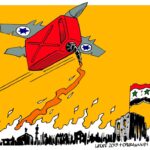
That poison gas was used appears undeniable. But who did so, remains unclear. We do not have the forensic means to establish the facts and it is unlikely that it will become possible in the future either – too high are the political stakes from both sides. Nor do we want to add another piece of futile conspiracy theory. The only applicable criteria for us is the political logic behind the event – and this remains difficult to understand.
Is it plausible that the regime wanted to deliberately provoke foreign intervention? Does it want to gain anti-imperialist credentials, given the limited military gains the use of combat gas could yield? Are they that much under pressure to resort to such means? Or did the chain of command get out of hands and unleash the nihilistic drive of a …
[read more]Haidar Eid (Gaza) reiterates quest for common democratic state
Opposes current talks with Israel
25/8/2013
Dr. Haidar Eid is Associate Professor in the Department of English Literature, Al-Aqsa University, Gaza Strip, Palestine. Dr. Eid is a founding member of the One Democratic State Group (ODSG) and a member of the Palestinian Campaign for the Academic and Cultural Boycott of Israel.
The world looks to a new round of negotiations under US Secretary of State Kerry – where is Gaza in those talks?
Gaza is diverse and I cannot speak for Gaza as one, but clearly most here are opposed to negotiations. Hamas laid out its official position on Tuesday with officials expressing their dismay at the resumption of talks. Most organizations within the Palestinian Liberation Organization (PLO) – among them the Popular as well as the Democratic Front for the Liberation of Palestine (PFLP and DFLP) – oppose the talks. Only some members of Fatah have fallen for the lie that negotiations might bring a viable solution.
Speaking for myself, as an advocate for one democratic state of Palestine, I oppose the talks, which aim at a two-state solution. We believe that creating two …
[read more]“Muslim Brothers armed fascists”
The narrative of the Egyptian secular left
25/8/2013 · by Amal Ramsis
Following letter we received from Amal Ramsis, a lauded Egyptian filmmaker and political activist of the Tahrir. She was invited to the Anti-imperialist Camp in Assisi, Italy, in 2012 to screen one of her films and to discuss the situation after the toppling of Mubarak. Her intervention is a reaction to an article written by a member of the editorial board of this website condemning the military’s coup d’état and denouncing the ensuing harsh repression against the Muslim Brotherhood. While we do not share her position, we feel that it is representative for a certain part of the Tahrir movement.

I wonder what does "democracy" mean for the Anti Imperialist Movement, specially when we are facing an armed fascist groups supported by the biggest imperialist power which is USA? What does "democracy" mean for a revolutionary group in such a situation?
How come you neglect that Muslim Brothers was the new elites assembled around the generals since 2011? Or should we condemn only the old one but welcome the new faces of these elites?
I wonder why the Anti-Imperialist Movement kept silent when a Constitution was announced by Muslim Brothers in November 2012, which was considered the real coup d'etat declaring Mursi the new dictator of Egypt?[fn]see two articles on this topic:
Mursi's presumption www.antiimperialista.org/mursi_s_presumtion
Mursi: pharao or revolutionary? …
[read more]Stop the military regime
Democracy means that also the Muslim Brothers are entitled to enjoy it
21/8/2013 · by Wilhelm Langthaler
By the military coup, the cracking down on the Muslim Brothers and the declaration of the state of emergency the generals attempt to restore the rule of the old social and (partially) also political elite. The army has been the central pillar of the global capitalist order in Egypt.

All those who believed that the popular movement could use the army against the Muslim Brothers have been taught a bitter lesson. It happened the other way round: the movement was used by the army against the Brotherhood suppressing the democratic achievements altogether!
As revolutionary democrats we condemn the military rule and the massacre against the Muslim Brotherhood (MB). We demand democratic rights for all including the MB, despite the fact that they themselves did not act according to the same principle. In Egypt the strategic main enemy of revolutionary democrats are the old elites assembled around the generals. Political differences and conflicts with Islamists including the MB must not lead to neglecting the old oligarchy and their power apparatus.
The military coup and …
[read more]Food Sovereignty, Land of Palestine
A vanguard experimentation in Palestine
7/8/2013 · by Maurizio Fratta
The world is dealing with an exponential growth of disease tightly connected to nutritional models dictated by the lifestyle which modern society has imposed. Amongst the pathologies connected to metabolism, the World Health Organization estimates that type two diabetes is assuming the characteristics of a real pandemic with more than 370 million affected of which four million are here in Italy only.
– But, at the same time the international scientific community is becoming aware of the extraordinary clinical results obtained throught the diets created by Mario Pianesi (Ma-Pi Diets) just in the cure of diabetes. These diets are based in accordance with the principles of ancient chinese medicine on variable percentages amongst cereals, vegetables, and proteins, and they are recommended in accordance with the severity of the pathological condition observed. The medical-clinical experiments which began in research centers in four continents (China, Mongolia, Thailand, Pakistan, Tunisia, Ivory Coast, Ghana, Cuba) after more than ten years have achieved results which could non longer be ignored, not even by official science.
– On the eighteenth of April an important communication …
[read more]Detroit's bankruptcy aims at pensions
1/8/2013 · By Jerry Goldberg
City of Detroit Emergency Manager Kevyn Orr, the figurehead named by reactionary Michigan Gov. Rick Snyder to run Detroit and usurp its elected political officials, filed a Chapter 9 bankruptcy on July 18, the largest municipal bankruptcy filing in U.S. history.
Orr claims that the city is unable to pay its approximately $20 billion in debt out of city revenues. Orr’s June 14 Proposal for Creditors and the bankruptcy petition itself make it clear that the bankruptcy’s real goal is to gut the pensions and benefits of Detroit’s over 20,000 retirees. Most of the debt to the banks that caused Detroit’s financial crisis is considered “secure debt,” to be paid despite the bankruptcy filing.
The list of Detroit’s top 20 unsecured creditors that was filed with the bankruptcy court places the General Retirement System of the city of Detroit and the Police and Fire Retirement System of the city of Detroit, as well as trustees associated with administering the pensions, at the top of the list to suffer the bulk of the losses in bankruptcy. …
[read more]Ramallah meeting for One Democratic state
Jaffa and Ramallah movements come together
20/7/2013
At the invitation of "The Popular Movement for One Democratic State on the Historic Land of Palestine" (which announced its launch on May 15, 2013), some 25 of the activists of the Jaffa Group for One Democratic State came to Ramallah on Saturday, July 13, to a joint meeting. It was the first meeting of this kind bringing together supporters of a comprehensive democratic solution to the Palestinian cause from both sides of the Green Line. Members of the constituent body of The Popular Movement hosted the meeting, while the visiting delegation included political and social activists, veterans and youth, artists, academics, Arab and Jewish opponents of Zionism.
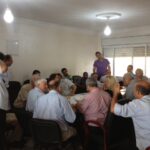
After the participants introduced themselves, there was a short presentation of the objectives of The Popular Movement and the Jaffa Group. It was clear that they share the same goal: resisting the occupation, settlements, ethnic cleansing and racial discrimination; bringing an end to the Apartheid regime in all its forms and in all places where it is present; ensuring the right of return for all Palestinian refugees to their homes and property and the establishment of One Democratic State on the entire land of Palestine. This state will be based on the implementation of the universal values of freedom, justice and human rights. It will be a civil state which rejects all forms of discrimination and guarantees full rights for all its citizens. It is worth mentioning that "The Popular …
[read more]Democratic coup?
Push back the army and reach out to the Islamic milieu
7/7/2013 · by Wilhelm Langthaler
The Muslim Brotherhood has gone too far. They were even unable to read the recent mass movement as a sign that their own influence was waning and some kind of compromise was necessary. Eventually the army intervened in form of a soft coup in order to avoid a further escalation and to stop the popular mass movement before it gets out of hand.
Success of the Tahrir
Everybody was surprised by the extraordinary momentum of the mass protests. Millions took to the streets across the entire county decisively tipping the relationship of forces within just a few days. This general mobilisation reached far beyond the original Tahrir milieu. (It suffices to watch the pictures of the numerous women with headscarves among the anti-Morsi camp to grasp how far the protest entered into the Islamic cultural environment.) Eventually the pressure became that big that the generals felt obliged to intervene.
Failure of the Muslim Brothers
On the other side of the medal stands the political failure of the Ikhwan, a failure whose extent has also surprised people. The Muslim Brothers proved unable to fulfil the democratic and social …
[read more]Everybody’s darling?
Some preliminary thoughts on Rohani’s election
28/6/2013 · by Wilhelm Langthaler
Everybody seems happy with the unexpected outcome of the Iranian presidential elections – with the notorious Israeli exception. Given the explosive regional and global tensions, one is inclined to think that there is something wrong with this apparent harmony, isn’t it?
The establishment
First of all it is the supreme leader Chameini who can be happy. The entire system of the Islamic republic displayed flexibility. Not only does the high turnout express political strength but the same holds for allowing a figure into the presidency which does not directly belong to the dominant faction. If there wasn’t the reports of Chameini having lent support to the conservative candidates (who scored all together less votes than Rohani), one would think that Chameini invented and created Rohani. For several reasons his presidency helps to resolve several problems:
The system softly and smoothly gets rid of the worn-out and disgraced president Ahmedinejad who during his ascent had attracted the lower classes to the system and still maintains some following. At …
[read more]Revolutionaries and Alevis
Addendum on Turkey’s Gezi park movement
23/6/2013 · by Wilhelm Langthaler
The article “Gezi park: between democracy and Kemalism, Chances and dangers for a social revolutionary left” closed with following proposition: “Based purely on the Alevite communal group revolution proved to be impossible.” Uncomprehending reactions invited me to offer a deeper explanation.
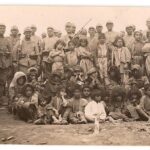
The radical left which during the military dictatorship rose in arms (paying a heavy price) has been alimenting itself mainly from the ranks of the Alevi community. The war waged by the junta against the Kurds with the most dirty of methods including mass eviction and dam projects in East Anatolia evoked a large migration to Western Turkey’s metropolis – in addition to the economic factors which pushes the population in the entire global south into the cities. Millions of uprooted and impoverished Alevis all of a sudden found themselves within an urban environment.
The Alevis have been known as social rebels. They staged several insurrections against the Ottoman Sultans leading to bloody crack-downs. They remained heavily oppressed different to other ethnic and sectarian minorities …
[read more]







